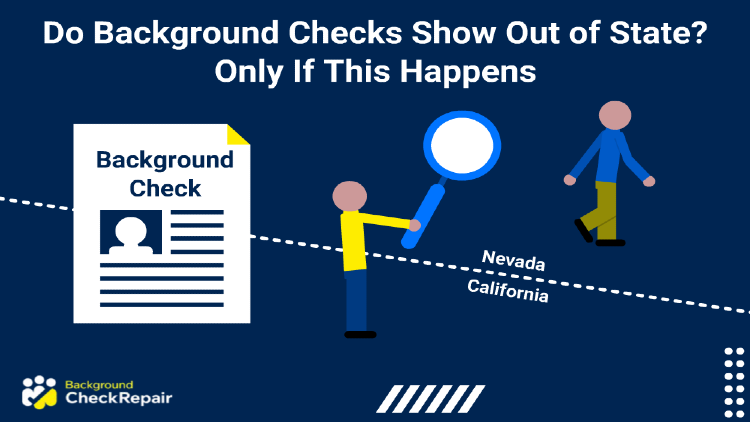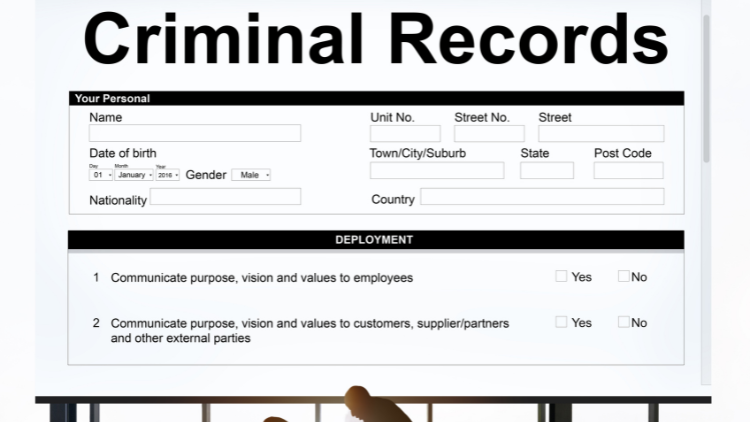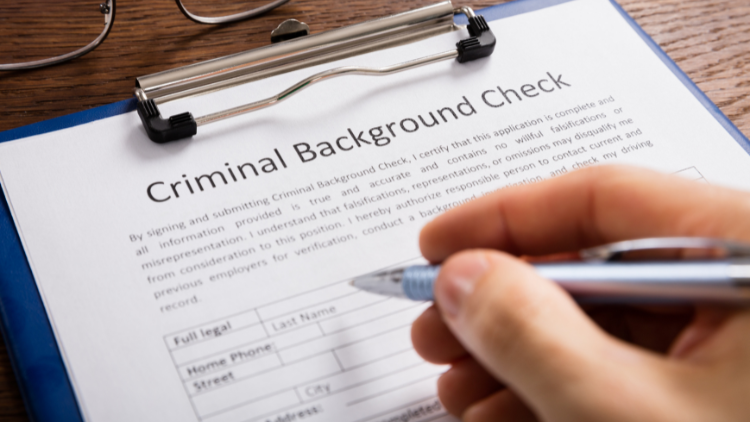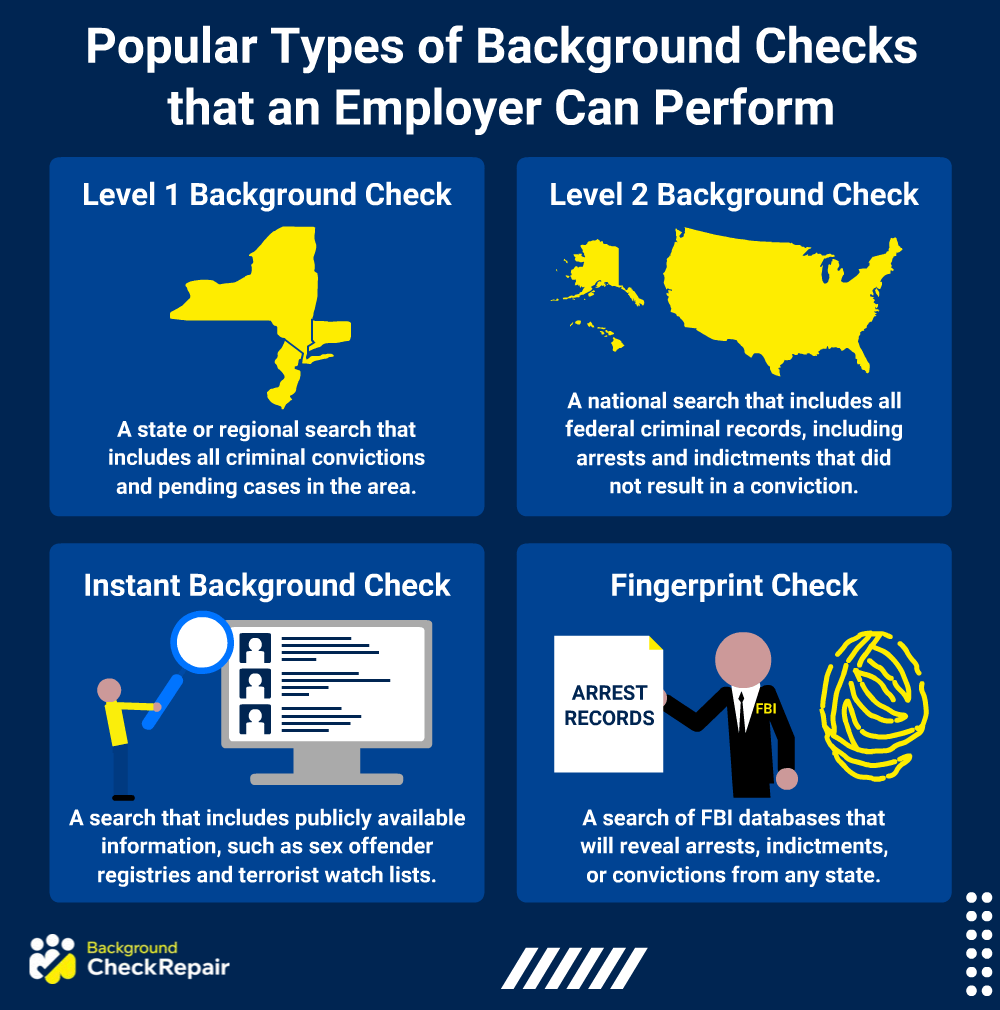We use cookies to ensure that we give you the best experience on our website. If you continue to use this site we will assume that you are happy with it
Do Background Checks Show Out of State? Only If This Happens
 Written by Background Check Repair
Written by Background Check Repair
Background Checks | February 20, 2026

Table of Contents
Do background checks show out-of-state information or criminal records? Many people are unaware that out-of-state criminal history is not always available on all background checks.
In fact, there’s only one way that out-of-state crimes and convictions are returned on a background screening: using a level 2 background check that shows federal information (also known as federal background investigations).
Alternatively, level 1 (name-based) state background checks only show if someone has a conviction in that specific state, county, or region where the search is conducted. These types of inquiries and basic level one checks do not reveal any convictions in other jurisdictions.
This means that it is critical to understand which level of background check was conducted. If your business requires more information about an applicant’s past (or the business you’re applying to work for), a level 2 or fingerprint search to access official FBI records may be requested. This will ensure a nationwide criminal check to be performed.
As explained in full detail below, knowing which kinds of background screenings show out-of-state information and how they can impact background reporting is critical for both employers and job seekers.
Understanding Level 1 and Level 2 Background Checks (Getting Out of State Criminal Records)
Which level of criminal history search is used (also known as a crime sheet) is usually based on the reason for the search in the first place, as well as the specifics of the position at hand. For example, a truck driver may be submitted to a check of driving records and drug tests, while an educator or nursing records check will be carried out based on separate criteria of nationwide background screening.
Depending on your state laws and industry legal requirements, you may only be able to request certain types of checks. For example, some employers simply want to know if an applicant has a past criminal history in their state or region, while others require (or are mandated by law) more disclosure about convictions that may not be immediately accessible to the general public. Interestingly, Florida records checks are where the official term “level 2 check” originated,
Almost all states require background checks and/or criminal background reports that check for sex crimes or crimes against children for specific jobs involving minors or vulnerable adults.
The differences between level 1 and level 2 background checks are distinctly based on how ‘deep’ the history search occurs. A state or regional search, using name only, includes information from the area where the check was performed… nowhere else. For instance, if you search North Carolina but an applicant has lived most of their life in Tennessee, their conviction history from TN will not appear in the level 1 search, even if they have a criminal record.
Level I Background Checks
A level I background check is the most basic type of search an employer can request. For example, suppose you conduct a level one background check on someone who has lived most of their life out-of-state. In that case, your results may not include any criminal history, even though an applicant has a prior misdemeanor or even felony convictions. The one exception is that most level 1 checks will search the National Sex Offenders Registry.
A level one check may be done in two ways:
- Searching a name only (middle name recommended)
- Using a social security background check (SSN) along with a person’s full name (middle name required)
The first option is preferred because it will help eliminate the chance of false positives or mismatches in public records (such as when two people share the same name).
However, this is not always possible, and using a name only is also an option. If this is the case, it is highly recommended to look for a person’s middle name first and then use their full name instead of only using their first and last name.
Jurisdictional boundaries limit level one background checks to a specific area and whether or not an individual’s record has been sealed, expunged, etc. For example, if someone is arrested but their charges are dropped for lack of evidence, then that information may not appear in their level 1 background check. The record still exists, however, unless the charges were expunged.
Level II Background Checks
A level two background check is a more thorough search and typically utilizes fingerprints, but it can also be more expensive depending on how many records you request from each source. For example, a national criminal history search will include every federal and state offense across the country for a particular individual. The level two check accesses FBI criminal databases, which contain information on individuals from all 50 states, as reported by law enforcement agencies that participate.

When asking how far back a level 2 records search goes, the answer is there is no specific time frame, although most searches explore 5-10 years of records. Level two background checks can reveal every offense an applicant has committed as long as they were convicted or pleaded guilty to those charges or crimes, even if it was 20 years ago and in another state.
If you are unsure of what type of background check to conduct, it is always best to seek the guidance of a trustworthy background screening agency. They have the resources available to assist you with finding out anything from someone’s residential location to their education and professional credentials and often check a variety of criminal and public databases.
A reliable agency can also help you determine the needs of your business and the type of search that will best meet those needs. In addition, a professional background check provider will ensure employers properly follow all privacy rights guidelines and legislation regarding the sharing of an applicant’s personal data. For example, the FCRA (Fair Credit Reporting Act) is a federal law that sets the ground rules for background checks and gives applicants the right to request their report to verify the accuracy of information.1
What Does a Background Check Show?
Do background checks show out-of-state crimes and convictions and include a copy of all criminal records? Only when the check accesses national databases.
A background check can provide employers with information about certain aspects of a job applicant’s past that are relevant to the position being offered. Background checks include criminal history, employment verification, education records, and more.
The type of background check you need will often depend on your industry. For example, healthcare employers (both public and private) perform extensive background checks, with graduating levels. This means that the search a doctor undergoes will likely be more stringent than the search involved for a janitor in a hospital. Although a check on the janitor will still be conducted, ones like a caregiver background check can include much more information.
When conducting a background search, employers must always follow the state and federal regulations governing the use and dissemination of the information. For example, Title VII prohibits discrimination in hiring on the basis of race or color. This includes prohibiting employment decisions based on an applicant’s arrest records or conviction history.
In addition, many individual states do require you to follow “ban the box” laws which prohibit an employer from inquiring about an applicant’s criminal history on a job application. If your state has these types of laws, then you can only conduct a background check after candidates have completed the application process or once you make a conditional employment offer.
Popular types of background checks that an employer can perform include:
- Level 1: A state or regional search that includes all criminal convictions and pending cases in the area.
- Level 2: A national search that includes all federal criminal records, including arrests and indictments that did not result in a conviction.
- Instant background checks: A search that includes publicly available information, such as sex offender registries and terrorist watch lists.
- Fingerprint check: A search of FBI databases that will reveal arrests, indictments, or convictions from any state.
Many employers also consider pre-employment background checks necessary because in states where they are permitted, it can decrease hiring costs by weeding out any failures early on, making them an essential part of the HR process, along with personal interviews and reference checks.
By using various methods to assess an applicant’s qualifications, businesses can reduce their risk of hiring someone who is not suited for the job. This can be done in person off the Internet or through hiring a pre-employment background screening company to save time.
What Information Will Show Up on a Fingerprint Background Check? (Do Background Checks Show Out of State Arrests?)
Do background checks show out-of-state convictions if fingerprints are used? Typically, yes, if the fingerprints are used to search national criminal databases and records. But, every search has its limitations, and not all past crimes or convictions will be revealed through criminal history searches.
A fingerprint background check is a more thorough search that will provide the most information about an applicant’s criminal history. This type of search can uncover arrests, indictments, and convictions from any state in America. However, it is essential to note that not all crimes are eligible for inclusion on a fingerprint background check.
Some offenses have limitations or barriers that may (but not always) prevent their inclusion in a criminal history search.
These offenses include but are not limited to:
- Juvenile offenses
- First-time offenders
- Plea-down crimes such as misdemeanors that were plea-bargained down to infractions
- Convictions for which the statute of limitations has expired
- Charges that were subsequently dismissed or resulted in an acquittal
- Offenses that occurred more than seven years ago
Generally, if an offense is not eligible for inclusion on a fingerprint background check, it will not show up on a standard criminal history search.
If you want to see how much time a fingerprint records check will take, then the answer is that it depends on how many records need to be searched. It can take anywhere from a few days to a couple of weeks to obtain and process all documents.
It is important to understand the limitations of each type of search before you decide on which one to conduct. By using various methods to assess an applicant’s qualifications, businesses can reduce their risk of hiring someone who is not suited for the job. In addition, enlisting the services of a reputable background-checking agency will ensure that all available criminal history data is acquired and presented to your company.
State Public Record Checks Versus FBI Background Check
When considering criminal history searches, there are two main types of checks: state public record checks and FBI background checks. Each probe has unique benefits, limitations, and stipulations.
A state public record check is a search of all records that are available to the general public, which includes all civil and criminal court records and statewide databases of criminal arrests and convictions.
A state public record check or county background check can be conducted through online databases operated by the state or county, or by contacting individual states’ law enforcement agencies. You may also access public records by visiting your local clerk of court and filing the necessary forms.

A state public record check is a good option for businesses seeking a broad overview of an applicant’s criminal history. Although time-consuming, this search will show any arrests or convictions from states where an applicant has lived, if that particular state is searched. However, because state public records searches are limited to information in the public domain, certain types of crimes and convictions will not show up on a background check.
Conversely, what information will an FBI background check show? An FBI background check is a more comprehensive search that will provide the most information about an applicant’s criminal history. This type of search can uncover arrests, indictments, and convictions from any state in America.
The FBI has several databases to draw information for a background check. These databases include:
- National Instant Criminal Background Check System (NICS) – This database conducts firearms background checks.
- Criminal Justice Information Services (CJIS) – This database contains information on criminal history, fingerprints, and wanted persons.
- Interstate Identification Index (III) – This database is a national index of criminal records that includes arrest information and booking photos.
- State-level databases which are not available to the general public.
How To Run an Employment Background Check Across Multiple States
Conducting a federal background investigation by running a background search across multiple states can be time-consuming and labor-intensive. However, conducting an employment background check in this manner is often necessary for businesses that will hire workers with criminal convictions, who have lived outside of the state.

To run an employment background check across multiple states, you must search each state’s civil or public court records individually. You can find email and other contact information for each state’s court system by contacting your local clerk of court.
Alternatively, you can use a level 2 search to determine whether someone has a felony record without conducting a search with each individual court (which would be extremely taxing and expensive).
You can request an FBI criminal background check by providing a cover letter, a set of classifiable fingerprints, and paying an $18 processing fee. This type of report can take up to 13 weeks to complete (to get results more quickly, a fast-track FBI records check is available through the use of a channeler, or pre-approved agency).2
It is important to note that not all states participate in the FBI’s criminal history database. Therefore, to conduct a complete background check, include a search within state-level databases, not available to the general public.
The best way to ensure a comprehensive background check is to use the services of a reputable background-checking agency. A good agency will have access to all of the necessary databases and will be able to conduct the most comprehensive search. Be sure to ask your chosen agency about their experience with multi-state searches and their success rate.
While free background check websites exist, it is highly recommended to avoid such products. These sites often do not provide accurate or thorough information and contain outdated records.
Do background checks show out-of-state information is a crucial question for businesses that may need to consider a potential employee’s criminal history from other states. By understanding the different types of searches available, you can decide the best way to conduct a successful background check.
How Long Does a Background Check Take?
If you need to know the duration of a criminal history search, background check reporting times can vary. The time it takes to complete a background check depends on the type of search conducted.
A Level I or State background check can be completed within minutes using an online database. However, if you search individual state law enforcement agencies and circuit courts, the process will take longer because each agency must manually enter data into its system. This can take several weeks, depending on the agency’s resources and the length of time it takes to find a record.
An FBI background check can take up to 13 weeks because the FBI must manually conduct this search by accessing several databases available to the FBI. Further, each letter of an applicant’s name is examined for variations. This type of report also contains information about arrests, indictments, and convictions from any state in America.
If a timely turnaround is vital to your search, it is best to use the services of a reputable background-checking agency and an expedited digital fingerprint service. These agencies have access to all necessary databases and can usually complete a thorough search within days or weeks. While some state-level databases are not available to the general public, a reliable background-checking agency will have access
Because most employers are legally required to utilize the most up-to-date information regarding an applicant’s background screening, it is vital to use a background checking agency that uses biometrics and other modern security measures to keep your info safe and secure. A reputable agency will also explain which databases are being searched and how the search is conducted.
So, do background checks show out-of-state info… some criminal background checks do, and some don’t, the answer depends on the type of search that is employed.
References
1Collatz, Andrea. 24 August 2021. FCRA Compliance for Background Checks: What Is It & Why Is It Important? ShareAble. 7 December 2021. Web. <https://hires.shareable.com/blog/fcra-compliance-background-checks>
2Office of the State Superintendent of Education. ND. How to Request a FBI Criminal History Record. 7 December 2021. Web. <https://osse.dc.gov/sites/default/files/dc/sites/osse/publication/attachments/Criminal%20History%20Report%20all%20other%20applicants_8.pdf>
